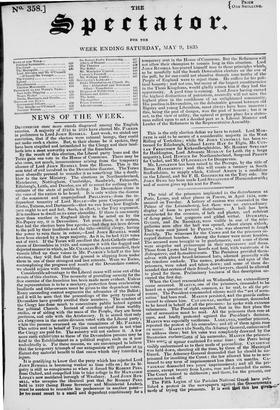NEWS OF THE WEEK.
DEVONSHIRE once more stands disgraced among the English counties. A majority of 3755 to 3128 have elected Mr. PARKER in preference to Lord JOHN RUSSELL. Last week, we stated our conviction, that if the electors were rational beings, they could not make such a choice. But, to their shame be it spoken, they have been stupified and intimidated by the Clergy and their landlords into a most unworthy exereise of the franchise. By the result of this election, the Liberal party loses and the Tories gain one vote in the House of Commons. There may be also some, not much, inconvenience arising from the temporary absence of Lord JOHN RUSSELL from the House. This is the sum total of evil involved in the Devonshire disaster. The Tories most absurdly pretend to consider it as something like a death blow to the new Ministry. The elections in Northumberland, Manchester, Nottingham, Cambridge, Sandwich, Falmouth, Edinburgh, Leith, and Dundee, are all to count for nothing in the estimate of the state of public feeling. In Devonshire alone is the voice of the nation to be heard. It is only within the diocese of the consistent and unprejudiced PHILLPOTS—from the in dependent tenantry of Lord ROLLE—the pure Corporations of
Exeter, Totness, and Dartmouth—that we can learn how Englishmen ought to act and feel. Such, in effect, is the Tory argument. It is needless to dwell on its utter absurdity. If there is one county more than another in .England likely to be acted on by the 10-Popery cry, it is Devonshire. Yet even there, it is certain, that had the electors been free agents,—had they not been driven to the poll by their landlords and the tithe-owninc, clergy, having
the power to ruin them in estate,--Lord JoHNIZUSSELL would have been elected by a large majority. As it is, be had 3128 votes out of 6883. If the Tories will recollect the Anti-Catholic enthu siasm of Devonshire in 1829, and compare it with the dogged and
dejected manner in which, as Mr. CHARLES BIJLLER remarked, their vassals lifted up their voices in Mr. PARKER'S behalf at the late
election, they will find that the ground is slipping from under them in one of their strongest and last retreats. Were we Tories, contemplating the progress and result of the Devonshire contest, we should rejoice with trembling. Considerable advantage to the Liberal cause will arise out of the events of this election. The necessity of providing security for the free exercise of the franchise has been made more evident. Unless the representation is to be a mockery, protection from overbearing landlords and tithe-owners must be given to the dependent voter. Every succeeding contest augments the advocates of the Ballot; and it will be seen that the proceedings of the petty tyrants of Devonshire have greatly swelled their numbers. The conduct of the Clergy has done much to concentrate public hatred against the political Church. Instead of standing aloof from worldly ,strifes, or of siding with the mass of the People, they are fierce partisans, and side with the Aristocracy. It is stated that only
six clergymen in the entire division voted with the Liberal party ; while the parsons swarmed on the committees of Mr. PARKER.
This active zeal in behalf of Toryism and corruption is not what the Clergy are paid for. The aountry will not endure it. A few more such exhibitions as these of the Devonshire parsons may be
fatal to the Establishment as a political engine, such as it now undoubtedly is. For these reasons, we are encouraged to believe that the temporary triumph of our antagonists will produce at no distant day material benefit to that cause whit* they intended to injure. It is gratifying to know that the party which has rejected Lord JOHN RUSSELL is becoming weaker as time rolls on ; for its bigotry is Still as conspicuous as when it forced Sir ROBERT PEEL from Oxford, and compelled him to take refuge in Sir MANASSEH LOPEZ 's now mutilated borough of Westbury. Lord JOHN Rustuna., who occupies the identical post that Sir ROBERT PEEL held in 1829 (being Home Secretary and Ministerial Leader), must be content to resemble his predecessor in another point!), kio must resort to a small and dependent constituency for a
temporary seat in the House of Commons. But the Reformers will not allow their champion to remain long in this situation. Lord JOHN RUSSELL has proved himself true to those principles which, as be manfully told the South Devonshire electors on the eve of the poll, he for one could not abandon though nine-tenths of the People of England were to reject them. He suffers for his political honesty; and not one, but many of the largest constituencies in the Three Kingdoms, would gladly return him if they had the opportunity. A good time is coming. Lord JOHN having earned the highest distinctions of patriotism, assuredly will not miss the highest place in the confidence of an enlightened community. His position in Devonshire, on the debateable ground between old Bigotry and young Liberalism, must always have been insecure: this, being the post of danger, was the post of honour ; but it is not, in the view of utility, the natural or proper place for a statesman called upon to act a decided part as a Liberal Minister and Leader of the Reformers in the Representative Assembly.


























